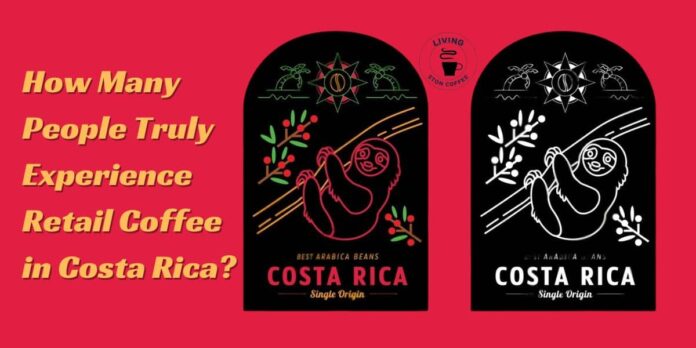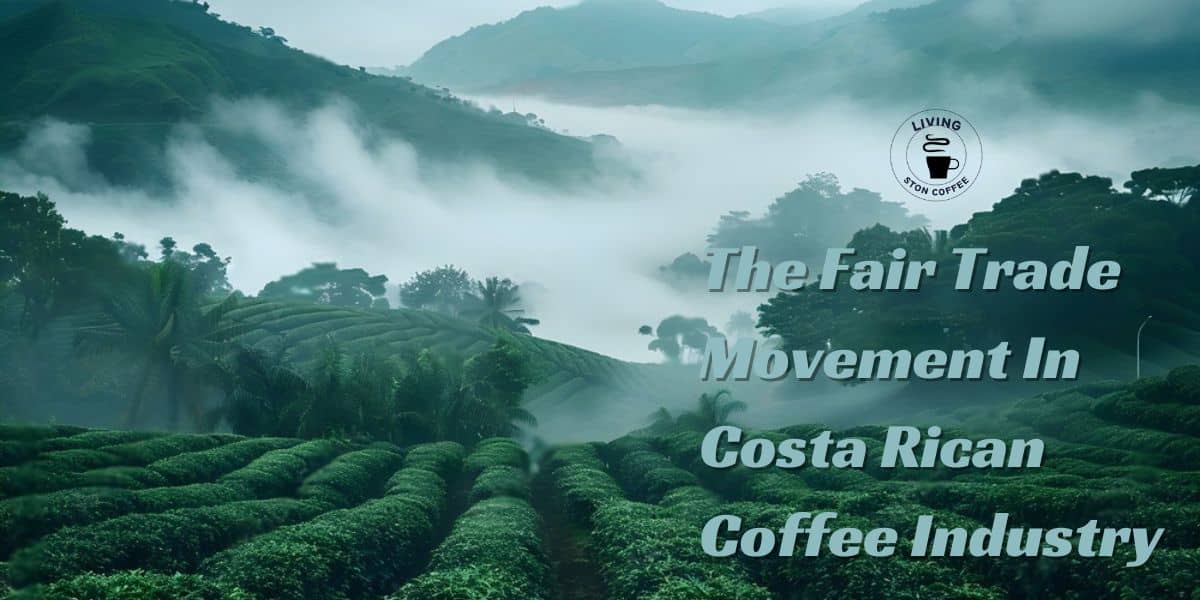On average, over 1.5 million people visit retail coffee shops in Costa Rica annually. The country’s rich coffee culture continues to attract a steady stream of locals and tourists to its renowned coffee establishments.
Costa Rica, renowned for its coffee, draws over 1. 5 million individuals to its retail coffee outlets each year. Costa Rica’s distinctive coffee culture serves as a major attraction for both locals and tourists. Consequently, retail coffee shops become bustling hubs for coffee enthusiasts of all kinds, offering a vibrant experience rooted in tradition and innovation.
With its rich history and dedication to quality, Costa Rica’s coffee scene continues to captivate visitors from around the world. Whether it’s sipping a cup of freshly brewed coffee or learning about the intricate process of coffee production, the country’s retail coffee shops offer an immersive experience that appeals to a broad audience.
The Essence Of Costa Rican Coffee
Costa Rica attracts a considerable number of visitors to its retail coffee outlets due to the rich and authentic essence of its coffee. With its unparalleled blend of flavors, Costa Rican coffee attracts coffee enthusiasts from all around the world.
Historical Significance Of Coffee Production In Costa Rica
The production of coffee in Costa Rica has a deep-rooted historical significance, dating back to the 18th century when it became one of the country’s primary exports. Coffee production in Costa Rica has played a pivotal role in shaping the country’s economy and national identity. The rich history of coffee cultivation in this region has contributed to the development of premium coffee varieties that are celebrated globally for their exceptional quality and flavor.
Costa Rica’s Unique Microclimates And Its Impact On Coffee Flavors
The diverse microclimates of Costa Rica have a profound impact on the flavors and characteristics of its coffee. The varying elevations, temperatures, and rainfall patterns across different regions create a unique environment for coffee cultivation. These distinct microclimates result in a wide range of flavor profiles, from vibrant citrus notes to smooth chocolate undertones, making Costa Rican coffee a delight for discerning coffee connoisseurs.
The Cultivation Process: From Bean To Cup
Growing and harvesting coffee beans in Costa Rica is a meticulous process that involves several stages to ensure unparalleled quality. The cultivation process begins with the careful selection of coffee varietals best suited to the microclimate of a particular region. The beans are then nurtured through sustainable agricultural practices, including shade-grown methods that preserve the natural ecosystem. After harvesting, the beans undergo rigorous processing, including washing and sun-drying, to preserve their inherent flavors and aromas. This attention to detail ensures that each cup of Costa Rican coffee delivers an exquisite and authentic taste.
The Retail Coffee Scene In Costa Rica
The retail coffee scene in Costa Rica attracts a considerable number of visitors. The thriving industry sees a steady flow of coffee enthusiasts seeking out unique blends and local flavors. With its rich coffee culture, Costa Rica continues to be a popular destination for coffee tourism.
Coffee Shops In Costa Rica: A Booming Industry
The coffee shop scene in Costa Rica is experiencing remarkable growth, reflecting the nation’s deep-rooted coffee culture and the increasing demand for high-quality, specialty brews. Visitors flock to Costa Rica enticed by its vibrant coffee shop culture. Here, both locals and tourists revel in a diverse range of coffee experiences, fostering a communal atmosphere that celebrates the rich tapestry of flavors and traditions.
The Rise Of Specialty Coffee Shops In Urban Areas
In urban areas across Costa Rica, there has been a notable increase in specialty coffee shops, each offering a unique and immersive coffee experience. These establishments cater to coffee enthusiasts, providing a platform for local farmers to showcase their exceptional produce. As a result, the retail coffee sector has become a focal point for social gatherings, fostering a sense of community while celebrating the art of coffee making.
Traditional Coffee Farms Turned Into Inviting Coffee Retail Spaces
Traditional coffee farms in Costa Rica have evolved into inviting coffee retail spaces, where visitors can explore the entire coffee production process. These transformed spaces offer an educational and sensory journey, providing insight into the rich history and craftsmanship behind Costa Rica’s renowned coffee culture. It’s an immersive experience that connects visitors with the origins of the coffee they enjoy.
Coffee Consumption Habits Of Locals
Local coffee consumption in Costa Rica is a popular trend, with a significant number of people visiting retail coffee shops. The vibrant coffee culture reflects the country’s deep-rooted connection to coffee, attracting both locals and tourists alike to savor its rich flavors and aroma.
The Role Of Coffee In Costa Rican Social Gatherings
Coffee holds a significant place in the hearts and homes of Costa Rican locals. It plays a central role in the country’s social gatherings, whether it’s a formal gathering, a casual get-together, or even catching up with friends and family. The aroma of freshly brewed coffee fills the air and invites people to sit down, relax, and engage in meaningful conversations. It’s not just about the beverage itself; it’s about the experience and connection that coffee brings to these social interactions.
Traditional Brewing Methods And Rituals
In Costa Rica, coffee brewing is an art form carefully carried out using traditional methods and rituals. Locals take pride in their brewing techniques, which have been passed down through generations. One popular method is the traditional “corridor,” a cloth filter placed on a wooden stand or metal frame, through which hot water is poured over ground coffee to produce a rich, aromatic brew. These brewing rituals add an element of charm and tradition to the coffee culture in Costa Rica.
How Locals Perceive And Appreciate Coffee Flavors
Costa Ricans have cultivated a deep appreciation for the various flavors and characteristics of coffee. They understand that each region and farm produces unique profiles based on factors such as altitude, soil type, and climate. Locals take pleasure in exploring different coffee flavors, from the citrusy notes of Tarrasa beans to the chocolate undertones of beans from the Central Valley. Each cup of coffee is savored, with flavors contemplated and enjoyed to their fullest extent.
Additionally, Costa Ricans place great importance on sustainability and ethical practices in the coffee industry. They appreciate coffee that is organic, fair trade, and sourced from farms that prioritize environmental conservation. This commitment aligns with their love for the land and recognition of the importance of preserving it for future generations.
In conclusion, the coffee consumption habits of locals in Costa Rica reflect a deep-rooted appreciation for the beverage and its cultural significance. From social gatherings to traditional brewing methods and an appreciation for diverse flavors, coffee holds a special place in the hearts of Costa Ricans. It not only connects people but also showcases their commitment to sustainability and ethical practices in the coffee industry.
Understanding Coffee Tourism In Costa Rica
Authenticity And Sustainability In Costa Rican Coffee
Discover the number of visitors at retail coffee shops in Costa Rica, where authenticity and sustainability take center stage. Experience the vibrant coffee culture firsthand and indulge in the rich flavors of this unique Central American country.
The Importance Of Supporting Sustainable Coffee Practices
Sustainable coffee practices are paramount in Costa Rica, a country known for its rich coffee heritage. As the demand for coffee grows globally, it becomes increasingly important to ensure that the production and consumption of coffee are environmentally and socially responsible. Supporting sustainable coffee practices not only helps protect the environment but also ensures the well-being of the farmers and their communities.
The Fair Trade Movement In Costa Rican Coffee Industry
The Fair Trade movement has gained traction in the Costa Rican coffee industry, aiming to promote equity and fair prices for coffee producers. By engaging in Fair Trade practices, consumers can contribute to improving the livelihoods of coffee farmers who often face challenges due to fluctuating prices and market uncertainties. It allows consumers to have a positive impact on the lives of those who bring their beloved morning brew to their table.
Preserving The Authenticity Of Costa Rican Coffee Amidst The Rise Of Global Demand
Costa Rican coffee has gained a reputation for its exceptional quality and unique flavor profiles. However, as demand for coffee increases worldwide, there is a risk of compromising the authenticity of Costa Rican coffee. To counter this, it becomes crucial for both consumers and producers to emphasize the preservation of traditional coffee growing and processing methods. By staying true to their heritage, Costa Rican coffee growers can maintain the distinctive flavors and characteristics that make their coffee so renowned.
Frequently Asked Questions Of How Many People Visit Retail Coffee In Costa Rica?
How Popular Is Retail Coffee In Costa Rica?
Retail coffee is extremely popular in Costa Rica. It is an integral part of the country’s culture and economy. Costa Ricans deeply value their coffee production, and this pride resonates in its consumption among both locals and tourists. Moreover, the coffee serves as a unifying force, connecting people through a shared appreciation for its exquisite flavors and profound cultural significance.
Are There Coffee Tours Available In Costa Rica?
Absolutely! Costa Rica hosts diverse coffee tours. Visitors discover the coffee-making process, sample various types, and immerse in the rich coffee culture directly.
These tours are educational, entertaining, and a must-do for coffee enthusiasts.
What Makes Costa Rican Coffee Unique?
Costa Rican coffee is renowned for its exceptional quality and flavor profile. The country’s climate, altitude, volcanic soil, and meticulous cultivation methods contribute to the distinctive taste. It is often described as smooth, bright, and with notes of citrus, chocolate, and caramel.
Conclusion
Costa Rica’s retail coffee is a magnet for visitors, thanks to its rich cultural heritage and thriving industry. Consequently, tourists and locals flock to experience the captivating blend of tradition and innovation that these coffee establishments offer. The enchanting landscapes and chance to taste fresh brews captivate locals and tourists. With distinct flavors and sustainable practices, the industry thrives, boosting Costa Rica’s economy and global coffee reputation.




